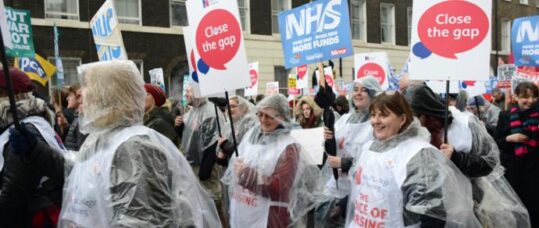The new NHS pay deal – timeline of scrapping the cap

December 2009
A fixed 1% pay rise for public sector staff from 2011/12 was announced in a pre-budget report by Labour Chancellor Alistair Darling. NHS staff received a 2.4% rise in 2009 and 2.25% in 2010.
The head of the NHS Sir David Nicholson warned ‘we see that [the 1%] as a pay cap – not as a right for everybody’.
June 2010
A two-year public sector pay freeze was announced Chancellor George Osborne, except for those on £21,000 or less, as part of the Coalition government’s austerity package.
Mr Osborne said: ‘I know there are many dedicated public sector workers who work very hard and did not cause this recession – but they must share the burden as we pay to clean it up.’
June 2013
Pay rises were capped at 1% – below the rate of inflation.
July 2015
In his summer budget Mr Osborne pledged to continue the cap. He said: ‘To ensure we have public services we can afford, and protect more jobs, we will continue recent public sector pay awards with a rise of 1% per year for the next four years.’
Related Article: ‘Patients not prisoners’: Palliative care nursing behind bars
September 2016
Health unions told the NHS pay review body it could be in breach of minimum wage rules unless it put £280m more into the NHS by 2021.
January 2017
Conservative health minister Philip Dunne defended the pay cap. He told a debate triggered by former community nurse Danielle Tiplady that ‘nurses do deserve a pay increase, but these are not normal times’.
The petition calling for an end to health service pay restraint was signed by 105,390 people.
March 2017
The government say the public sector pay cap would continue until April 2018. It announced a 1% pay rise for NHS staff.
The RCN’s chief executive and general secretary Janet Davies said: ‘The Government will deter new people from joining the nursing profession at the very moment it is failing to retain staff and European colleagues in particular head for the door.
‘It amounts to another real-terms cut to pay packets – the Government is still refusing to keep nursing wages in line with inflation. The Government has already cut nursing pay by 14% in real-terms – leaving too many struggling and turning to foodbanks and hardship grants.’
April 2017
Labour promised a rise in NHS pay to a ‘sustainable level’ ahead of June’s general election.
June 2017
The Institute for Fiscal Studies estimated that a 3% rise in public sector pay would cost £5bn.
The RCN campaigned under the slogan #ScraptheCap, with nurses staging events across the country to gain public support. The RCN also staged a ‘summer of protest’. At a rally in Whitehall, president Cecilia Anim told Prime Minister Theresa May ‘ignore us at your peril’.
EastEnders actress Maddy Hall added her voice and said ‘nurses are the glue that hold us all together’.
Related Article: Gypsy, Roma and Traveller healthcare: How can primary care serve this group?
September 2017
The summer of protests culminated in a rally attended by nurses from around the UK at Parliament Square in London in September, which was addressed by comedian Sir Tony Robinson and Rob Delaney from TV show Catastrophe.
RCN chair of council Michael Brown warned it would ballot members or industrial action if there was no move to scrap the cap in the Chancellor’s autumn budget.
The RCN said the pay cap affected recruitment, with an estimated 40,000 unfilled nursing jobs.
Meanwhile, the police received a 1% pay rise, plus a 1% bonus, and prison officers get a 1.7% pay rise, breaking through the public sector cap.
October 2017
Health secretary Jeremy Hunt announced the unpopular 1% pay cap had been scrapped, admitting it was no longer sustainable.
He said: ‘We recognise it wasn’t sustainable to carry on with the 1% going forward and that’s why next year we’ve been given the leeway to have more flexible negotiations.’
But later in the month, he claims that the chancellor will not fund a pay rise unless the NHS ‘improves productivity’.
November 2017
Chancellor Philip Hammond confirms the ending of the 1% pay cap in the Budget, but only if the current pay structure is ‘modernised’.
In an interview with the Health Service Journal, Mr Hunt states that he is looking to reform the system of pay increments.
Related Article: Raising the profile of social care nursing and encouraging research in London
December 2017
The RCN tell the NHS pay review body nurses should get a pay rise in line with RPI inflation plus £800 to make up for lost earnings.
March 2018
A new pay deal is agreed between the NHS and the unions. Primary care nurses on Agenda for Change contracts will receive a 6% increase in pay over the next three years.

See how our symptom tool can help you make better sense of patient presentations
Click here to search a symptom


The new NHS pay deal has been years in the making – Nursing in Practice takes a look at how the pay cap was created, and then scrapped.



